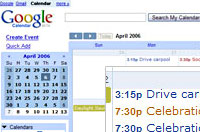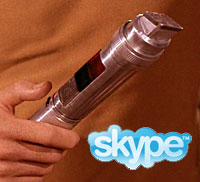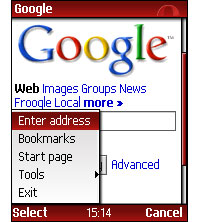 Google Earth/Maps
Google Earth/Maps
If you haven’t heard of AJAX (Asynchronous Javascript And Xml) you’re not a techie. It’s the buzzword of the moment and Google Maps uses it brilliantly (Google Mail is another example). It’s pretty old technology that uses the power of the client to locally render information delivered by the server. With Google Maps the browser loads a small Javascript application and sends data/requests back to the server which then delivers the next bit of data which the client then renders i.e. moving around a map.Google Earth is the next step in actually showing satellite data of the area you’re looking at (you can see cars parked in your street). Why would they want to offer these services? More advertising. Do a map search and you can also see information on local services (or restaurants, petrol stations, bars etc).They are both very powerful, easy-to-use apps. Google Calendar
Google’s latest AJAX application, Outlook calendaring but hosted centrally so it can be accessed from anywhere. Of course it’s more than just a calendar as it allows subscription to other calendar/events, sharing of calendaring information and even mobile synchronisation.Privacy
There’s been a lot of media interest in what information Google store about you as they could abuse it and the authorities could request it to see what you’ve been doing.  It’s uncertain how much information they do store, but it could be quite considerable. They actually might not know it’s you personally, but your computer. Google uses cookies which are used to track your personalisation settings, but they can store a lot more info, though Google are likely to just use the cookie as the identifier which enables them to quickly personalise things.Just looking at the information they could store when you do a search, it’s the search criteria itself, then which sites you clicked through to. But that can be combined with other info like what Google Map info you looked at, who you emailed through Google Mail and your previous search history. That may lead to a bleak picture if you’re committing illegal acts.The other side to it all is that the processing of all this information is extremely resource hungry and though Google are particularly good at correlating information, they might not bother. They will for some aspects, but most of the time it’s probably not worth it and they’ll keep succinct summarized information.If the authorities want to know what your doing, it’s actually much easier for them to go to your ISP and request the information from them (if they are running caching equipment which speeds up Web access for all users, they don’t just know what searches you’ve been doing, but every Website you’ve accessed and everything you’ve down or uploaded).The Future
It’s uncertain how much information they do store, but it could be quite considerable. They actually might not know it’s you personally, but your computer. Google uses cookies which are used to track your personalisation settings, but they can store a lot more info, though Google are likely to just use the cookie as the identifier which enables them to quickly personalise things.Just looking at the information they could store when you do a search, it’s the search criteria itself, then which sites you clicked through to. But that can be combined with other info like what Google Map info you looked at, who you emailed through Google Mail and your previous search history. That may lead to a bleak picture if you’re committing illegal acts.The other side to it all is that the processing of all this information is extremely resource hungry and though Google are particularly good at correlating information, they might not bother. They will for some aspects, but most of the time it’s probably not worth it and they’ll keep succinct summarized information.If the authorities want to know what your doing, it’s actually much easier for them to go to your ISP and request the information from them (if they are running caching equipment which speeds up Web access for all users, they don’t just know what searches you’ve been doing, but every Website you’ve accessed and everything you’ve down or uploaded).The Future
Google are encroaching into territory that used to be securely within the MS domain, desktop search and now IM. In the IM market they’re using open protocols which will gather traction from both the open source community and allow interesting applications to spawn from it.With things like Google Maps/Earth, searching has been moved from the electronic (or Internet) world to the real world. Google are already toying with mobile, but you can be sure that’s the space they’ll enter next.Imagine your smartphone or PDA with a local Google application installed. As you move around, it uses location based services and delivers relevant local information straight to the device. Looking for a restaurant? It’s got Google Talk too, so you can chat or really talk to the restaurant and book a table before you get there. Google are going to dominate the desktop and the mobile space and it’ll all happen in the background.Microsoft must be quaking as Google are their biggest threat.Let’s hope the Google Empire is benevolent and doesn’t become an evil behemoth.References
GMail Drive shell extension
Web
Google, The Next Dark Empire? Pt2
BBC World Cup Online Via Broadband
 The BBC Sport Website will be carrying all of the World Cup 2006 football matches – Live. It will be only open to UK broadband users (or non-UK clever clogs who can set up a proxy or two).
The BBC Sport Website will be carrying all of the World Cup 2006 football matches – Live. It will be only open to UK broadband users (or non-UK clever clogs who can set up a proxy or two).Not content to having such a major, big ticket event being carried online, broadband uses will have the advantage of being able to listen to live commentary from Radio Five Live, while reading the kick-by-kick accounts in text.
 Panic in the network departments of companies around the UK will be settling in tomorrow morning as they realise quite how many of the employees will be sneaking a watch of the matches while at work. We suspect that bosses will be sanctioning, or possibly even buying TV for the staff to watch, rather than have their networks melt around them.
Panic in the network departments of companies around the UK will be settling in tomorrow morning as they realise quite how many of the employees will be sneaking a watch of the matches while at work. We suspect that bosses will be sanctioning, or possibly even buying TV for the staff to watch, rather than have their networks melt around them. The BBC are keen to point out that this won’t be the first time they’ve shown football or even sports events online. The final of the Club World Championship between Liverpool and Sao Paulo was shown in 2005, as was the Athens 2004 Olympics. They also plan to stream Wimbledon for the first time this year.
The BBC are keen to point out that this won’t be the first time they’ve shown football or even sports events online. The final of the Club World Championship between Liverpool and Sao Paulo was shown in 2005, as was the Athens 2004 Olympics. They also plan to stream Wimbledon for the first time this year.While this is clearly a major headline grabber, we do wonder how many people will be actually be watching the games on their computer. What is more certain is that not many will be using it as their major TV source (except us of course). It’s more likely that they’d just run it alongside their TV.
The BBC isn’t having it all their own way. We know of several National newspapers and some local papers that will be sending journalists out to the World Cup to file video reports. This World Cup will be the most tech’d up so far.
Nokia Mobile S60 Browser Code Goes Open Source
 At the W3C conference in Edinburgh today, in a move to get the mobile industry (and possibly more) to standardise on a single Web browser, Nokia has released the source code for the mobile Web browser it developed last year.
At the W3C conference in Edinburgh today, in a move to get the mobile industry (and possibly more) to standardise on a single Web browser, Nokia has released the source code for the mobile Web browser it developed last year.Using the same open-source frameworks used by Apple’s Safari browser, originally created by the KDE team, Nokia designed a browser for its S60 phone range, adding various enhancements designed to improve mobile browsing.
Under the open source deal, any individual software developer, third party mobile phone makers or operators can get their grubby mitts on the software engine that powers the Nokia-developed browser and customise it for their own needs.
Nokia’s S60 Web Browser for S60 is a fully fledged affair, offering full mobile browsing of complete Web pages straight off the Internet, complete with support for AJAX technologies, dynamic HTML and scripting languages.
Nokia intend to offer “active participation” with the open source community, sharing enhancements, widgets and improvements to the core browser engine in real time.
 “We want to reduce the fragmentation currently in place in mobile browsing,” said Lee Epting, VP of Forum Nokia, Nokia’s software development support program.
“We want to reduce the fragmentation currently in place in mobile browsing,” said Lee Epting, VP of Forum Nokia, Nokia’s software development support program.Although sceptics may suggest the last thing rivals would want to do is to start using a Nokia browser, she insisted that the terms of the ‘liberal license’ would let anyone use the code to develop their own commercial offerings.
The source code will be made available to open source developers through the WebKit Open Source Project.
Further resources can also be found at Nokia Opensourcesite and Nokia S60 browser.
Silver Surfer Week 2006
 Crumblies all across the UK are being given the chance to try out the new fangled interwebby thing thanks to Age Concern’s ‘Silver Surfer Week.’
Crumblies all across the UK are being given the chance to try out the new fangled interwebby thing thanks to Age Concern’s ‘Silver Surfer Week.’Co-sponsored by BT, Intel and Microsoft, the initiative aims to help old folks understand the benefits of using e-mail and the internet as well as improving their technical skills.
More than 1,500 IT taster sessions have been set up with old ‘uns being shown how they can order shopping and services from the comfort of their own favourite chair.
There’ll also be a bus loaded with computers touring the UK.
 Silver Surfer Clubs
Silver Surfer Clubs
The campaign marks the start of a three year partnership between Age Concern England and BT, with a (rather miserly) budget worth £240,000 helping to turn Age Concern’s 150 nationwide computer “drop ins” and access points into a unified network of “Silver Surfer Clubs”.The initiative comes on the back of BT research which found that 9.7 million people over the age of 60 are currently ‘digitally excluded’ in the UK.
Age Concern’s own research found that a total of 44% of over-50s are without internet access, but of those already hooked up to t’Web, most thought the benefits far outweighed the costs.
 Frankie’s story
Frankie’s story
Booking holidays and tracing family histories were the some of the most popular uses of the Web for OAPs, with Age Concern director general Gordon Lishman adding that the internet also enabled silver surfers to pursue hobbies or meet new friends online.Take old Frank Jones, 74, for example.
A bonkers budgerigar nut all his life, Frank popped into a computer clinic run at his local church drop-in centre to learn some digital skills.
Before you know it, Frankie had learnt how to use a digital camera and was soon sending hardcore budgie porn all over the world to new mates he’d made in places like Australia, New Zealand, Canada, Pakistan and Indonesia.
“I never dreamt my budgerigars would help me find friends all over the world with the same passion,” says Frank.
With his new found skills, Frank was soon teaching others, notching up a level 2 City and Guilds qualification and bagging a nomination for an Adult Learner Award. Go Frankie boy!
 “Before I began the courses, I’d never even switched a computer on,” says Frank. “I’m now planning to create my own Website that my family and friends can visit to see my latest photographs and exchange messages. It’s a great way to share experiences and keep in touch.”
“Before I began the courses, I’d never even switched a computer on,” says Frank. “I’m now planning to create my own Website that my family and friends can visit to see my latest photographs and exchange messages. It’s a great way to share experiences and keep in touch.”With a report last year by the Independent Consumer Panel for the UK communications watchdog Ofcom revealing that older folks felt alienated from digital life, we naturally warmly welcome Age Concern’s drive to get silver surfers online.
Just so long as they don’t start posting up on forums to whine on about how things were “much better back in the old days…kids today, no respect…look at the price of that… etc”
Skype Security Hole Patched
 Skype users are advised to upgrade their software in double quick time after a security bug was reported late last week by a security researcher in New Zealand.
Skype users are advised to upgrade their software in double quick time after a security bug was reported late last week by a security researcher in New Zealand.Rating the vulnerability as ‘medium risk’, Skype says that the bug affects several versions of the Skype client for Windows and could allow an evil attacker to download a file from an affected PC without permission.
It has to be said that it’s a little bit obscure – to get stung by this fella you’d have be first tricked into visiting a nefarious Web page set up by the attacker who would need to have already added the victim to his contact list.
Danish bug tracking firm Secunia said that the “moderately critical” flaw was in Skype’s parsing of URLs, so a malformed link – sent in a Skype message, for example – could begin the transfer of a file without the victim’s consent,
 The bug affects all releases of Skype for Windows up to and including version 2.0.x.104, as well as version 2.5.x.0 up to and including 2.5.x.78. Skype advised users to upgrade to Skype 2.5, release 2.5.x.79 or later, or Skype 2.0, release 2.0.x.105 or later.
The bug affects all releases of Skype for Windows up to and including version 2.0.x.104, as well as version 2.5.x.0 up to and including 2.5.x.78. Skype advised users to upgrade to Skype 2.5, release 2.5.x.79 or later, or Skype 2.0, release 2.0.x.105 or later.A free upgrade is available online now (select ‘help’ and ‘check for update’ from the drop-down menu).
This is the first security bulletin issued by Skype in around seven months – good news for us as we use the program every day.
IT Staff Top Stressed-Out League
 IT workers who spend all day battling with clueless idiots who have just deleted critical OS files because they looked ‘messy’ already know it, but now it’s official: people who work in IT are the most stressed folks on the planet.
IT workers who spend all day battling with clueless idiots who have just deleted critical OS files because they looked ‘messy’ already know it, but now it’s official: people who work in IT are the most stressed folks on the planet.Surging ahead of traditional stress leaders like medicine, engineering and education, a survey conducted by research firm SWNS for online learning provider SkillSoft found that a staggering 97% of IT workers claim to find their life at work “stressful on a daily basis”.
The poll – involving more than 3,000 people – also discovered that four-fifths of IT consultants felt stressed “before they even enter the workplace”, while around a quarter were so crushed by the “enormous pressure to perform at work” that they’d taken time off suffering with stress.
One poor techie sod who responded to the survey blubbered into his Coke can, “I spend most of my day fielding calls from people who don’t even have a basic knowledge of computers and printers. It is amazing the amount of time I spend teaching people where the on-off button is. And when I do actually find a technical problem to solve, I have my manager breathing down my neck wondering why I have a backlog of complaints.”
Meddlin’ managers
Interfering managers were also found to be a source of extra stress, with a third of IT professionals saying that pesky meddling managers made it difficult for them to get their jobs done.The survey unearthed the main stress factors for people at work (why not see how many you can tick off?!) and these include deadlines, workload, feeling undervalued, having to take on other people’s work, lack of job satisfaction, lack of control over the working day and having to work long hours.
The survey insists that employers should take the problem of stress seriously, citing the Health & Safety Executive’s research that puts stress as the biggest cause of working days lost through injury or ill health [an estimated 12.8 million lost days each year].”
In case you’re wondering about the other stressful jobs, here’s SkillSoft’s top ten stressful jobs
 IT
IT
Medicine/Caring Profession
Engineering
Sales and Marketing
Education
Finance
Human Resources
Operations
Production
Clerical
SkillsoftTop tips to avoid office frazzle Elsewhere, an “office stress” study conducted by CareerBuilder.com found that more than three quarters of respondents felt “job burnout”, while over half felt under a “great deal of stress.”
Rosemary Haefner, CareerBuilder.com‘s vice president of human resources insisted that “high-pressure work environments are taking their toll on workers’ morale,” adding that the stress “can be detrimental to both workers, whose health and career progress may suffer, and employers, who pick up the tab in higher insurance costs and lost productivity.”
Happily, ol’ Rosie babe kindly offered some four top tips to help reduce office stress:
– Organize and prioritize by taking care of the more difficult and important tasks early in the day.
– Manage expectations so that you can achieve your goals and deliver on promises to others.
– Set aside a period of time dedicated to responding to e-mail and voicemails.
– Lastly, take care of yourself. A healthier you is more productive and happier.We’d give that a go ourselves, but we’re busy with some idiot on the line and he’s… making…us…. chuffing…crazy… grrr…..
News Corp To Sell 24 Episodes on MySpace
 It comes as no surprise to the more cynical amongst us, but MySpace is set to offer downloadable digital content for sale from its sister company, Fox.
It comes as no surprise to the more cynical amongst us, but MySpace is set to offer downloadable digital content for sale from its sister company, Fox.This move is very significant clearly showing the direction that Murdoch is taking MySpace in. It’s going to become a great shop window to its 75 million users, of all of his other diverse types on content.
Episodes from series one to five of the hugely popular ’24’ series by Fox will be made available for download for $1.99 a programme, courtesy of a Burger King-sponsored deal which comes branded with the fast food giant’s tagline “Have it Your Way.”
(We know which way we’d like a Murdoch/Burger King deal, but it’s unprintable here).
MySpace, which is owned by media ubermensch Rupert Murdoch’s News Corporation, has more than 75m registered users worldwide, and according to Nielsen/NetRatings recorded 19.4 billion page views in March – dwarfing the 13.7 billion page impressions at Google for the same month.
 To entice users to fork out for the full service, Burger King will be offering free downloads of each of the first episodes from series one and five of ’24’
To entice users to fork out for the full service, Burger King will be offering free downloads of each of the first episodes from series one and five of ’24’Building up a formidable synergetic head of steam, Gillian Smith, senior director of media at Burger King, effused: “We know our customers spend a lot of time [on MySpace]. The important thing for us as an advertiser was to make sure we were providing content that resembles entertainment more than advertising.”
 The Burger King/Fox/MySpace love-in reflects the growing power of MySpace as a new distribution platform and advertising magnet, leading Bambi Francisco of MarketWatch to wonder what might happen if MySpace developed a search engine of its own
The Burger King/Fox/MySpace love-in reflects the growing power of MySpace as a new distribution platform and advertising magnet, leading Bambi Francisco of MarketWatch to wonder what might happen if MySpace developed a search engine of its ownSkype On-The-Fly Translation Service Introduced
 Skype’s new Language Line Personal Interpreter service claims to make it easy to “talk instantly to anyone, anytime, anywhere in the world, regardless of language.”
Skype’s new Language Line Personal Interpreter service claims to make it easy to “talk instantly to anyone, anytime, anywhere in the world, regardless of language.”Sadly nowhere near as cool as Star Trek’s Universal Translator, Skype’s new offering uses human translators who can collectively offer on-the-fly translation services for more than 150 languages.
The service comes courtesy of a partnership with Language Line Personal Interpreter Services and promises to make it easier for businesses and individuals to babble in tongues to each other over VoIP for just $2.99 per minute.
Subscribers to the service can take part in online conferences with up to five other Skype users with a live Language Line Services interpreter doing all the translation stuff.
The new service, which uses Voxeo’s Prophecy voice platform to automate the process of transferring the call from Skype to Language Line Services, will be available around the clock, with costs being automatically charged to the caller’s SkypeOut account.
Saul Klein, vice president of marketing at Skype, whipped up the PR froth: “Language Line’s Personal Interpreter Service greatly enhances the Skype experience for our growing multilingual customer base.
 “Our consumers can now use the Skype technology to easily communicate in the languages their customers and friends prefer to speak,” he added.
“Our consumers can now use the Skype technology to easily communicate in the languages their customers and friends prefer to speak,” he added.In the multinational corporate world, there’s certainly big bucks to be earned from translation services, as Louis Provenzano, senior VP, sales and marketing, Language Line Services, noted:
“Every day, virtually all Fortune 500 multinational corporations, and businesses of all sizes around the world, depend on Language Line Services to assist them in communicating with their customers in their own languages.”
UK e-Shoppers To Spend £26bn In 2006
 UK shoppers are set to spend an average £1,000 each online in 2006, according to the yearly report by the Interactive Media in Retail Group (IMRG).
UK shoppers are set to spend an average £1,000 each online in 2006, according to the yearly report by the Interactive Media in Retail Group (IMRG).The ‘industry body for e-retailing’ has forecast that mouse-clicking Brits will shell out £26bn online in the UK in 2006, as online shopping goes stratospheric.
According to IMRG’s figures, online shopping has grown by 2,600 percent over the last five years, with the £2bn sales notched up in November and December 2005 representing a hefty 50 percent rise the same period in 2004.
Moreover, IMRG predicts that 2006 will see ten percent of all purchases being made online.
The explosive rise in Internet shopping is seen as a result of more consumers having broadband and retailers making better use of the Internet, but the report warned of online retailers still facing challenges.
 According to IMRG’s own research, usability, customer retention, and interactive marketing were cited as the biggest concerns by over half of their members, with e-crime and delivery fulfilment seen as high-priority issues by around a third.
According to IMRG’s own research, usability, customer retention, and interactive marketing were cited as the biggest concerns by over half of their members, with e-crime and delivery fulfilment seen as high-priority issues by around a third.Why-aye Big Spender!
Elsewhere, web testing firm SciVisum’s recent research on regional e-commerce spending found that consumers in the north east of the UK spent the most online, and were also the most likely to fork out for high-value goods.The survey found that a third of consumers in the NE spent between £50 and £100 per month and had no qualms about dishing out sums as large as £5,000 for a single online purchase.
 Compare that to stingy shoppers in the south who said that they’d spend no more than £50 per month online, and wouldn’t dream of shelling out sums as high as £5,000.
Compare that to stingy shoppers in the south who said that they’d spend no more than £50 per month online, and wouldn’t dream of shelling out sums as high as £5,000.Not surprisingly, the most popular online purchases were books and CDs, purchased by three quarters of shoppers.
Around fifty per cent of shoppers said they would buy holidays and electrical goods online, while a quarter do their grocery shopping and finances online.
Opera Mini 2.0 For Mobiles Released
 Nordic browser kings Opera Software have released Opera Mini 2.0, a spanking new version of their tiny Web browser that runs on almost all mobile phones.
Nordic browser kings Opera Software have released Opera Mini 2.0, a spanking new version of their tiny Web browser that runs on almost all mobile phones.Building on the success of the first version – which has already notched up 2.5 million users since its January 2006 release – Opera Mini accelerates mobile surfing by using compression and reformatting techniques.
The latest version of the Java-powered browser adds a selection of tweaks and refinements, including the ability to download multimedia content, like images and MP3s, directly to the phone.
There’s also a selection of new skins available to customise the look of the browser, and a natty new multisearch feature, letting users select extra search engines for the home page.
 Also new for version two is a speed dial widget, which lets surfers call up bookmarks by assigning shortcut key combinations.
Also new for version two is a speed dial widget, which lets surfers call up bookmarks by assigning shortcut key combinations.“Opera Mini has kick-started real mobile Web browsing by enabling non-smartphone owners to surf the full Internet on their phones, just as they do on their PCs,” purred Jon S. von Tetzchner, CEO, Opera Software.
 With Opera Mini supporting mobile commerce via SMS, users can directly buy ringtones, games and other content for delivery as an SMS.
With Opera Mini supporting mobile commerce via SMS, users can directly buy ringtones, games and other content for delivery as an SMS.This system lets the seller set the price with charges appearing in the phone bill as an SMS.
The new browser is compatible with a host of phones, smartphones and PDAs (including Sony Ericsson, Pocket PC and Palm handets) and can be downloaded for free by typing in http://mini.opera.com into your WAP-tastic browser or by delivery via SMS download for a small fee.
 The BBC Sport Website will be carrying all of the World Cup 2006 football matches – Live. It will be only open to UK broadband users (or non-UK clever clogs who can set up a proxy or two).
The BBC Sport Website will be carrying all of the World Cup 2006 football matches – Live. It will be only open to UK broadband users (or non-UK clever clogs who can set up a proxy or two). Panic in the network departments of companies around the UK will be settling in tomorrow morning as they realise quite how many of the employees will be sneaking a watch of the matches while at work. We suspect that bosses will be sanctioning, or possibly even buying TV for the staff to watch, rather than have their networks melt around them.
Panic in the network departments of companies around the UK will be settling in tomorrow morning as they realise quite how many of the employees will be sneaking a watch of the matches while at work. We suspect that bosses will be sanctioning, or possibly even buying TV for the staff to watch, rather than have their networks melt around them. At the W3C conference in Edinburgh today, in a move to get the mobile industry (and possibly more) to standardise on a single Web browser, Nokia has released the source code for the mobile Web browser it developed last year.
At the W3C conference in Edinburgh today, in a move to get the mobile industry (and possibly more) to standardise on a single Web browser, Nokia has released the source code for the mobile Web browser it developed last year. “We want to reduce the fragmentation currently in place in mobile browsing,” said Lee Epting, VP of Forum Nokia, Nokia’s software development support program.
“We want to reduce the fragmentation currently in place in mobile browsing,” said Lee Epting, VP of Forum Nokia, Nokia’s software development support program. Crumblies all across the UK are being given the chance to try out the new fangled interwebby thing thanks to Age Concern’s ‘Silver Surfer Week.’
Crumblies all across the UK are being given the chance to try out the new fangled interwebby thing thanks to Age Concern’s ‘Silver Surfer Week.’ Silver Surfer Clubs
Silver Surfer Clubs Frankie’s story
Frankie’s story “Before I began the courses, I’d never even switched a computer on,” says Frank. “I’m now planning to create my own Website that my family and friends can visit to see my latest photographs and exchange messages. It’s a great way to share experiences and keep in touch.”
“Before I began the courses, I’d never even switched a computer on,” says Frank. “I’m now planning to create my own Website that my family and friends can visit to see my latest photographs and exchange messages. It’s a great way to share experiences and keep in touch.” Skype users are advised to upgrade their software in double quick time after a security bug was reported late last week by a security researcher in New Zealand.
Skype users are advised to upgrade their software in double quick time after a security bug was reported late last week by a security researcher in New Zealand. The bug affects all releases of Skype for Windows up to and including version 2.0.x.104, as well as version 2.5.x.0 up to and including 2.5.x.78. Skype advised users to upgrade to Skype 2.5, release 2.5.x.79 or later, or Skype 2.0, release 2.0.x.105 or later.
The bug affects all releases of Skype for Windows up to and including version 2.0.x.104, as well as version 2.5.x.0 up to and including 2.5.x.78. Skype advised users to upgrade to Skype 2.5, release 2.5.x.79 or later, or Skype 2.0, release 2.0.x.105 or later. IT workers who spend all day battling with clueless idiots who have just deleted critical OS files because they looked ‘messy’ already know it, but now it’s official: people who work in IT are the most stressed folks on the planet.
IT workers who spend all day battling with clueless idiots who have just deleted critical OS files because they looked ‘messy’ already know it, but now it’s official: people who work in IT are the most stressed folks on the planet. IT
IT It comes as no surprise to the more cynical amongst us, but MySpace is set to offer downloadable digital content for sale from its sister company, Fox.
It comes as no surprise to the more cynical amongst us, but MySpace is set to offer downloadable digital content for sale from its sister company, Fox. To entice users to fork out for the full service, Burger King will be offering free downloads of each of the first episodes from series one and five of ’24’
To entice users to fork out for the full service, Burger King will be offering free downloads of each of the first episodes from series one and five of ’24’ The Burger King/Fox/MySpace love-in reflects the growing power of MySpace as a new distribution platform and advertising magnet, leading Bambi Francisco of MarketWatch to wonder what might happen if MySpace developed a
The Burger King/Fox/MySpace love-in reflects the growing power of MySpace as a new distribution platform and advertising magnet, leading Bambi Francisco of MarketWatch to wonder what might happen if MySpace developed a  Skype’s new Language Line Personal Interpreter service claims to make it easy to “talk instantly to anyone, anytime, anywhere in the world, regardless of language.”
Skype’s new Language Line Personal Interpreter service claims to make it easy to “talk instantly to anyone, anytime, anywhere in the world, regardless of language.” “Our consumers can now use the Skype technology to easily communicate in the languages their customers and friends prefer to speak,” he added.
“Our consumers can now use the Skype technology to easily communicate in the languages their customers and friends prefer to speak,” he added. UK shoppers are set to spend an average £1,000 each online in 2006, according to the yearly report by the Interactive Media in Retail Group (IMRG).
UK shoppers are set to spend an average £1,000 each online in 2006, according to the yearly report by the Interactive Media in Retail Group (IMRG). According to IMRG’s own research, usability, customer retention, and interactive marketing were cited as the biggest concerns by over half of their members, with e-crime and delivery fulfilment seen as high-priority issues by around a third.
According to IMRG’s own research, usability, customer retention, and interactive marketing were cited as the biggest concerns by over half of their members, with e-crime and delivery fulfilment seen as high-priority issues by around a third. Compare that to stingy shoppers in the south who said that they’d spend no more than £50 per month online, and wouldn’t dream of shelling out sums as high as £5,000.
Compare that to stingy shoppers in the south who said that they’d spend no more than £50 per month online, and wouldn’t dream of shelling out sums as high as £5,000. Nordic browser kings Opera Software have released Opera Mini 2.0, a spanking new version of their tiny Web browser that runs on almost all mobile phones.
Nordic browser kings Opera Software have released Opera Mini 2.0, a spanking new version of their tiny Web browser that runs on almost all mobile phones. Also new for version two is a speed dial widget, which lets surfers call up bookmarks by assigning shortcut key combinations.
Also new for version two is a speed dial widget, which lets surfers call up bookmarks by assigning shortcut key combinations. With Opera Mini supporting mobile commerce via SMS, users can directly buy ringtones, games and other content for delivery as an SMS.
With Opera Mini supporting mobile commerce via SMS, users can directly buy ringtones, games and other content for delivery as an SMS.